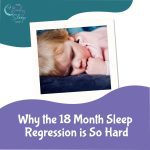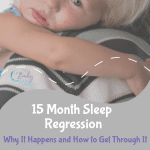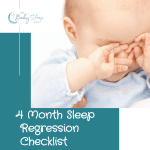
Oh, parents – I’m so sorry to have to break this news. After three (yes, THREE) sleep regressions, you’re not done yet. 🙁 And the 18 month sleep regression? Yeah…it’s one of the worst second only to the 8 month sleep regression.
BUT that doesn’t mean that you’re powerless in the face of the 18 month sleep regression – not at all! We’re always here for you, readers – even in the face of one of the toughest sleep regressions you’ll face.
18 Month Old Toddler Sleep Regression: What It Looks Like
Basically, you’ll know you’re facing the 18 month sleep regression when your toddler, who was sleeping just fine, thankyouverymuch, is suddenly NOT sleeping so fine. You will probably see shorter and more erratic naps, more bedtime drama, increased night waking, and/or really early-morning wake-ups.
Since lists are nice, when you’re trying to troubleshoot, you can also be on the lookout for these signs:
- Increased fussiness and crying (aka major crankiness!)
- Changes in appetite
- Extra clinginess and a need for more cuddle time

18 Month Old Toddler Sleep Regression: Why It Happens
If you remember, the 8/9/10 month sleep regression was the result of a ‘perfect storm’ of circumstances – at that age, your baby’s mobility and physical skills were just exploding, which led to disrupted sleep. Well, 18 months presents another ‘perfect storm’ – only this time, it’s a perfect storm of discipline issues! At 18 months, your toddler is no doubt learning that she can say ‘no’ to mommy and daddy (and say it LOUDLY at that) – and that defiance most definitely carries over to bedtime. While this growing independence isn’t all bad, by any means (this independent streak is also what will prompt her to learn how to put on her own shoes, and feed herself with a spoon), but it can lead to way more battles of will over things like bedtime and nap time.
And here’s what’s SUPER tricky about this: these two elements (your toddler’s newfound sleeplessness and your toddler’s newfound stubbornness and defiance) can end up influencing each other. Your toddler’s willful behavior can lead him to refuse naps or to shriek stubbornly for you each time he wakes at night. And of course, the lack of sleep caused by this regression can make your little one cranky, which leads to more tantrums and temper fits. It can turn into a vicious cycle of overtiredness and tantrums.
No wonder so many of our clients with 18 month olds report feeling like they’re nearing their breaking point!
Of course, the 18 month regression isn’t just about behavior issues – there are other factors in play here, too:
- Teething could be to blame. Around 18 months, children are cutting the 4 canine teeth as well as their first molars. This can cause discomfort that leads to disrupted sleep.
- Separation anxiety is still an issue for toddlers at 18 months. Most babies begin experiencing separation anxiety around 7 or 8 months, and for most babies, the anxiety is strongest from 10-18 months. This can lead to disrupted sleep as well — your baby may resist naps because he doesn’t want to be away from you, or he may wake at night and become upset that you’re not in the room with him.
18 Month Old Toddler Sleep Regression: 10 Survival Techniques
We first shared our 7 tips for 18 month sleep regression survival over on hintmama.com – check out the full list there!
For a quick, at-a-glance list of 10 tricks you can use to survive the 18 month regression – keep reading!
- Try a sticker chart to increase bedtime and nap time cooperation. Stickers hold great weight with most toddlers, so try using them as an incentive to help your toddler cooperate at bedtime and at nap time.
- Strengthen your bedtime routine, and give it a definitive end. Good bedtime routines are fairly short and VERY consistent. They also have a definite end – you might end with the same short song, or the same good night phrase. This is a strong signal to your toddler that it’s time for sleep.
- Try a lovey. If you haven’t given your toddler a comfort object, or a lovey, yet, this is a great time to start. If your 18 month old has something to keep in bed that feels cozy and comforting, it can minimize how often he calls for you at night or at nap time.
- Be prepared to offer extra naps (if she skips her usual ones) or an earlier bedtime. Part of the 18 month sleep regression involves fighting sleep (because what self-respecting toddler wants to sleep when she can play? ;)), so be ready to help your toddler compensate for missed sleep, in an effort to avoid overtiredness. (Just be sure that all naps are over by 6 p.m.).
- Offer a bedtime snack. Sometimes, a legitimate growth spurt can overlap with the 18 month sleep regression, so offering a high-protein bedtime snack can help to ward off middle-of-the-night hunger. Just make sure to brush teeth after snack time, and before bed!
- Offer a nightlight. By 18 months, your toddler may start having nighttime fears, so a very soft nightlight can provide a little reassurance.
- Offer simple explanations. Your toddler obviously isn’t at the age yet where you can hold real conversations, but it can be helpful to give your toddler reasons for WHY he needs to go to bed and get enough sleep. Keep your explanations simple, of course, and avoid over-explaining yourself (remember, your toddler is the king/queen of “but why?”) – but some simple explanations can help defuse sleep time drama.
- Don’t undo all your hard work. That is to say, if you’ve worked on sleep training, don’t go back to old sleep associations! Instead, comfort your toddler by doing mini-versions of whatever they find comforting. For instance, maybe hold your toddler when he wakes fussing, but hold him for a few minutes, instead of holding him all the way to sleep. Or lie down with him in his room, but be sure to leave before he falls asleep. This will provide comforting without creating new, bad sleep habits.
- Create firm ‘will’ and ‘will not’ boundaries, and then reinforce them for your toddler. For example, if your toddler isn’t allowed to sleep in your bed, then be sure to reinforce that even in the midst of the 18 month sleep regression. If you’ve decided for yourself that when your toddler cries for you at night, you’re going to wait 5 minutes before going into her room, then stay consistent with that.
- Be prepared to re-train, if necessary. Even small things, like a short cold, can throw off your child’s normally-great sleeping patterns. So it’s no wonder that a big sleep regression can do big damage! Don’t worry, though – you can get back on track. Give the regression a few weeks to sort itself out; at that point, if your toddler is still struggling with sleep, do some sleep training to get things back on track (trust me, it will most likely be a lot easier this time than it was the first time around!).
For more details on handling the 18 month sleep regression, check out our special VIP members-only resources in our Member’s Area:
18 Month Sleep Regression Tips Guaranteed To Work
Toddler sleep problems are definitely solvable – but they can be TOUGH to solve on your own. So why not connect with one of our caring, compassionate sleep consultants, and get expert answers to your nap questions today?
Browse our one-on-one expert sleep support options here.
Or, check out The 5 Step System to Help Your Toddler Sleep. Using the same unique approach and practical tools for success, this e-book helps you and your toddler sleep through the night and enjoy a better daytime schedule.









